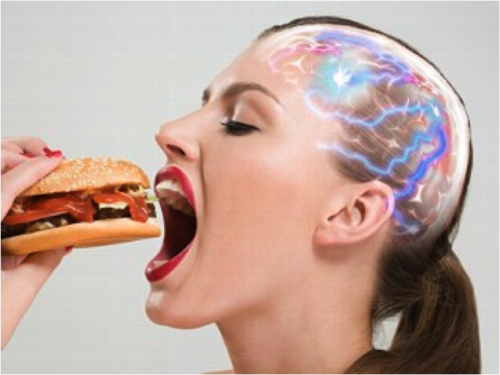Helen Ruddock, a first year PhD student at the University of Liverpool is researching appetite and food addiction. She discusses the interesting debate of whether we are addicted to food!
Have you ever vowed to cut the carbs only to find yourself tucking into a Maccy D’s by the evening? Or promised yourself ‘just one chocolate’ before polishing off the whole box? When it comes to food, many of us have difficulty controlling ourselves. And according to a recent survey, around half of people believe that they are actually addicted to foods high in fat and sugar (Meadows & Higgs, 2013). The popularity of the term ‘food addiction’ is reflected by the countless websites, books, and self-help groups all promising to cure you of your overindulgent eating habits. But before you sign up to your nearest ‘Overeaters Anonymous’, let’s take a closer look at whether or not ‘food addiction’ actually exists.

Are you a ‘food addict’?
Firstly, what do we mean by ‘addiction’? According to the Diagnostic and Statistical Manual for Mental Disorders (DSM-IV), a diagnosis of substance abuse is made if an individual meets at least 3 of the following criteria:
1) Tolerance. The individual needs increasing amounts of the substance to get the same ‘high’.
2) Withdrawal from the substances causes physical and emotional symptoms.
3) There is a persistent desire for the substance and repeated unsuccessful attempts to quit.
4) More of the substance is taken than intended.
5) There is a lot of time spent obtaining, using, or recovering from the substance.
6) Important social or occupational activities are reduced because of the substance.
7) The individual takes the substance despite knowing its negative consequences.
By this criteria alone, I’m sure that many of you are now utterly convinced that your love of Oreos warrants a diagnosis of substance abuse: You have a ‘persistent desire’ for them, you eat ‘more than intended’, and you continue to do so ‘despite negative consequences’. However, as much as you might berate yourself for these behaviours, they can hardly be deemed abnormal. This has led Gearhardt and colleagues (2009) to suggest that a diagnosis of ‘food addiction’ should only be made if your eating habits cause you ‘significant emotional distress’ or ‘impair your daily functioning’.
With these criteria in mind, we now see that so-called ‘food addiction’ is more than just an inability to control yourself around the buffet table. For some, it entails a distressing pattern of compulsive eating which impacts upon many areas of their lives. This has led some to suggest that Binge Eating Disorder (BED), characterised by regular bouts of overeating, may be the closest thing to an ‘addiction’ to food (Ziauddeen, Farooqi, & Fletcher, 2012). However, as distressing as it may be, can we really liken compulsive eating to drug abuse? To explore this possibility, we need to consider some of the more physical aspects of ‘food addiction’.
 Is binge eating an addiction?
Is binge eating an addiction?
Signs of withdrawal have been shown in rats. In a study by Colantuoni et al. (2002), rats who were withdrawn from a high sugar diet developed symptoms such as teeth chattering, tremors, and head shakes. The similarity between these symptoms and those experienced during heroin withdrawal are often taken as ‘proof’ of the addictive potential of sugar. However, while you may be convinced that giving up chocolate causes you insufferable side effects, food-related withdrawal is yet to be shown in humans (Gearhardt, 2009).
Another source of evidence used in favour of food addiction comes from brain studies. Like drugs, food is rewarding. It shouldn’t surprise you therefore that both drugs and food cause the release of dopamine (the brain’s ‘reward’ chemical) and activate areas of the brain involved in reward (Volkow et al., 2006; Volkow et al.,2002). What’s more, this rewarding response to food is even greater in ‘food addicts’ (Gearhardt et al., 2011). This might partly explain why some of us are apparently incapable of resisting the entire bar of Dairy Milk, while others will happily hoard their collection of Easter Eggs until Christmas. However, while drugs and food may act on similar brain areas, it is worth bearing in mind that the dopamine response to drugs is approximately 10 times greater than to food (Volkow & Wise, 2005).
Another major difference between food and drugs is that research is yet to pinpoint any specific ‘addictive’ substance in food. While sugar is one culprit, I doubt that many people resort to eating the white stuff straight from the bag (which we would surely do if we were true ‘sugar addicts’?) !
Even if we accept the idea of food addiction, it would most likely only apply to a small proportion of people with binge eating disorder. For the rest of us, one concern is that the term ‘food addiction’ could be used as an ‘excuse’ to overeat. At least, this was the view expressed by Professor John Blundell in an article for the BBC. And so, in light of the limited evidence linking overeating and drug abuse, perhaps we should stop blaming our love of Krispy Kremes on brain chemistry and start relinquishing control of what we eat. Maybe it is possible to eat ‘just one chocolate’ after all.
A contribution by Helen Ruddock, UoL, for PsychLiverpool.





